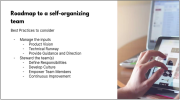Written by: Rishea Middlebrooks MHI, CAPM
In today's rapidly changing business environment, organizations need to be agile, innovative, and customer-centric to survive and thrive. However, traditional hierarchical structures and command-and-control approaches can be barriers to achieving these goals.
Take a look at Alex Lantukh’s presentation on to learn how identify, manage, and improve self-organizing teams and ultimately organizational performance!
Presentation Overview 
Self-organizing teams have emerged as a promising alternative to traditional hierarchical structures that hinder an organization’s ability to survive and thrive in business environments. These teams are allowing employees to collaborate and innovate in a more dynamic and adaptive manner. This presentation explores the benefits of and the strategies by which we might leverage self-organizing teams at scale to drive flow and improve organizational performance.
Takeaways
Optimizing Flow as a concept
- How Flow has been used
- Lean
- Six Sigma
- Kanban
- SAFe (Scaled Agile Framework)
- Considering Flow at scale
What are self-organizaing teams?
- Teams that are autonomously making decisions
What are the characteristics of a self-organizing team?
- Collaborative
- Autonomous
- Innovative
- Adaptive
- Communicative
- Responsible
- Empowering
- Accountable
Benefits of leveraging self-organizing teams at scale
- Increase speed and efficiency of software development
- Respond more quickly to changing market conditions
- Improve product quality and customer satisfaction
- Increase employee engagement and satisfaction
Challenges of leveraging self-organizing teams at scale
- Ensuring alignment with the organization’s strategic coals
- Maintaining consistency across multiple teams and products
- Managing dependencies and coordination across teams
Best practices for steering self-organizing teams
- Manage the inputs
- Product vision
- Technical runway
- Provide guidance and direction
- Steward the team(s)
- Define responsibilities
- Develop culture
- Empower team members
- Continuous improvement
Next Event
Join us at the next PMI Atlanta Chapter Technology forum on April 25, 2023
Register at www.pmiatlanta.org/events/event-calendar



